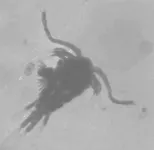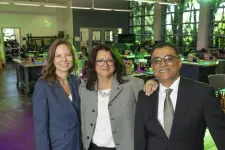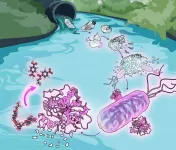Announcing the 2024 Glenn Foundation Discovery Awards: Jeffrey Friedman, MD, Ph.D/ (the Rockefeller University) and Myriam Heiman, Ph.D. (MIT)
Prestigious program supports pioneering discoveries in the biology of aging
2024-10-03
(Press-News.org)
Santa Barbara, CA and New York, NY -- The Glenn Foundation for Medical Research (GFMR) and the American Federation for Aging Research (AFAR) are pleased to announce the 2024 recipients of the Glenn Foundation Discovery Awards: Jeffrey Friedman, MD, PhD (Professor, The Rockefeller University and Investigator, Howard Hughes Medical Institute) and Myriam Heiman, PhD (Associate Professor of Neuroscience, Massachusetts Institute of Technology).
The Glenn Foundation Discovery Award supports research projects with strong potential to develop pioneering discoveries to understand the underlying biological mechanisms that govern normal human aging and its related physiological decline. Two, three-year awards of $525,000 are made annually ($175,000 per year for three years).
Dr. Friedman’s Discovery Award is titled “Cellular and Molecular Basis for Hypothalamus Aging.” By studying individual brain cells, Dr. Friedman aims to understand the changes that occur as we age. This knowledge could help develop new treatments for age-related diseases and improve overall health as we get older. Learn more about Dr. Friedman’s research here.
Dr. Heiman’s Discovery Award is titled “Charting the Cellular Rejuvenation Landscape in Aging Neurons.” Dr. Heiman aims to understand the mechanisms that underlie the exceptional longevity of nerve cells in our brain. If understood, these mechanisms could be targeted to restore nerve cell function in the context of aging and neurodegeneration and could also potentially be induced in other cell types of the body to increase the healthspan of the whole organism. Learn more about Dr. Heiman’s research here.
“The Glenn Foundation Discovery Award seeks to support investigators who have not previously been engaged in aging research, but whose research is relevant to understanding aging mechanisms and could lead to novel advances with significant potential to benefit human health and well-being,” states Mark R. Collins, President of the Glenn Foundation for Medical Research.
Notes Stephanie Lederman, EdM, Executive Director, AFAR: "The Discovery Awards create an opportunity for fresh perspectives to help better understand and therapeutically target the biological processes of aging. This not only this enriches the field of aging research at large but also paves the way toward interventions that will help us all live healthier, longer. AFAR is grateful for our decades-long partnership with the Glenn Foundation for Medical Research in various programs and for its visionary support of this highly impactful program.”
Learn more about the Glenn Foundation Discovery Award here.
###
About the Glenn Foundation for Medical Research - Founded by Paul F. Glenn in 1965, the mission of the Glenn Foundation for Medical Research is to extend the healthy years of life through research on mechanisms of biology that govern normal human aging and its related physiological decline, with the objective of translating research into interventions that will extend healthspan with lifespan. Learn more at glennfoundation.org.
About AFAR - The American Federation for Aging Research (AFAR) is a national non-profit organization that supports and advances pioneering biomedical research that is revolutionizing how we live healthier and longer. For more than four decades, AFAR has served as the field’s talent incubator, providing $212,500,000 to 4,460 investigators at premier research institutions to date—and growing. In 2024, AFAR expects to provide approximately $12,270,00 to 60 investigators. A trusted leader and strategist, AFAR also works with public and private funders to steer high quality grant programs and inter-disciplinary research networks. AFAR-funded researchers are finding that modifying basic cellular processes can delay—
or even prevent—many chronic diseases, often at the same time. They are discovering that it is never too late—or too early—to improve health. This groundbreaking science is paving the way for innovative new therapies that promise to improve and extend our quality of life—at any age. Learn more at www.afar.org.
END
ELSE PRESS RELEASES FROM THIS DATE:
2024-10-03
Human stem cell transplants successfully repaired macular holes in a monkey model, researchers report October 3rd in the journal Stem Cell Reports. After transplantation, the macular holes were closed by continuous filling of the space with retinal tissue.
“We confirmed for the first time in a non-human primate model that embryonic stem-derived retinal organoid sheet transplantation facilitates the closure of macular holes,” says senior study author Michiko Mandai of the Kobe City Eye Hospital. “Our results suggest that this method could become a practical, safe, and effective ...
2024-10-03
The moment a person steps off the street and into a restaurant—to take just one example—the brain mentally starts a new “chapter” of the day, a change that causes a big shift in brain activity. Shifts like this happen all day long, as people encounter new environments, like going out for lunch, attending their kid’s soccer game, or settling in for a night of watching TV.
But what determines how the brain divides the day into individual events that we can understand and remember separately? That’s what a new paper in the journal Current Biology aimed to find ...
2024-10-03
About The Study: Decades following treatment, one-third of childhood cancer survivors in this study reported elevated fear their cancer will recur or a subsequent malignant neoplasm will develop. Findings suggest that fear of cancer recurrence should be routinely screened, and clinically significant symptoms intervened upon as a part of survivorship care.
Corresponding Author: To contact the corresponding author, Nicole M. Alberts, PhD, email nicole.alberts@concordia.ca.
To access the embargoed study: Visit our For The Media website at this link https://media.jamanetwork.com/
(doi:10.1001/jamanetworkopen.2024.36144)
Editor’s ...
2024-10-03
About The Study: In this retrospective cohort study of women undergoing screening mammography, mean absolute artificial intelligence (AI) scores were higher for breasts developing vs not developing cancer 4 to 6 years before their eventual detection. These findings suggest that commercial AI algorithms developed for breast cancer detection may identify women at high risk of a future breast cancer, offering a pathway for personalized screening approaches that can lead to earlier cancer diagnosis.
Corresponding Author: To contact the corresponding author, Solveig Hofvind, PhD, email sshh@kreftregisteret.no.
To access the embargoed study: ...
2024-10-03
Highlights:
Mycobacterium tuberculosis, which causes tuberculosis (TB), is a threat to public health.
A new study identified that a semi-synthetic compound can be derived from natural compounds and shows potent activity against M. tuberculosis, including multi-drug resistant strains.
This is a promising step toward new potent treatment for TB.
Washington, D.C.—A new study published in the American Society for Microbiology journal Microbiology Spectrum demonstrates that a novel semi-synthetic compound can be derived from ...
2024-10-03
EL PASO, Texas (Oct. 3, 2024) – Scientists at The University of Texas at El Paso and Stanford University were recently surprised to find that the natural community of zooplankton — tiny, aquatic animals known to graze on bacteria — present in freshwater and saltwater do not clean water that is contaminated with fecal microorganisms.
The research, published today in the biology journal mSphere, reveals important insights about the limitations of zooplankton in treating bodies of water that have been contaminated with fecal organisms, the team said. A 2017 U.S. water quality inventory ...
2024-10-03
The rising demand for tech jobs presents an outstanding opportunity for growth and inclusivity in the industry. Developing accessible training programs tailored for individuals with disabilities can foster a more diverse workforce. Florida Atlantic University’s College of Education and the College of Engineering and Computer Science have received a $9,961,460 grant from the United States Department of Education’s Office of Special Education and Rehabilitative Services to increase the capacity and participation of transition-age youths and working-age adults with disabilities in high demand technology jobs locally and nationally. ...
2024-10-03
Tending a garden is hard work. Imagine it from the plants’ perspective. Each relies on fine-tuned genetic processes to pass down accurate copies of chromosomes to future generations. These processes sometimes involve billions of moving parts. Even the tiniest disruption can have a cascading effect. So, for plants like Arabidopsis thaliana, it’s good to have a backup plan.
“Chromosomes have to be accurately partitioned every time a cell divides,” explains Cold Spring Harbor Laboratory (CSHL) Professor and HHMI Investigator Rob Martienssen. “For that to happen, each chromosome has ...
2024-10-03
Increasingly complex applications such as artificial intelligence require ever more powerful and power-hungry computers to run. Optical computing is a proposed solution to increase speed and power efficiency but has yet to be realized due to constraints and drawbacks. A new design architecture, called diffraction casting, seeks to address these shortcomings. It introduces some concepts to the field of optical computing that might make it more appealing for implementation in next-generation computing devices.
Whether ...
2024-10-03
Researchers have long observed that a common family of environmental bacteria, Comamonadacae, grow on plastics littered throughout urban rivers and wastewater systems. But what, exactly, these Comamonas bacteria are doing has remained a mystery.
Now, Northwestern University-led researchers have discovered how cells of a Comamonas bacterium are breaking down plastic for food. First, they chew the plastic into small pieces, called nanoplastics. Then, they secrete a specialized enzyme that breaks down the plastic even further. Finally, the bacteria use a ring of carbon atoms from the plastic as a ...
LAST 30 PRESS RELEASES:
[Press-News.org] Announcing the 2024 Glenn Foundation Discovery Awards: Jeffrey Friedman, MD, Ph.D/ (the Rockefeller University) and Myriam Heiman, Ph.D. (MIT)
Prestigious program supports pioneering discoveries in the biology of aging




